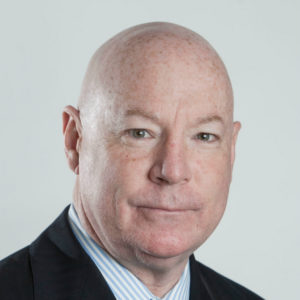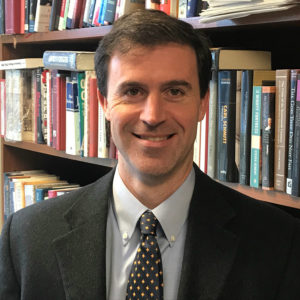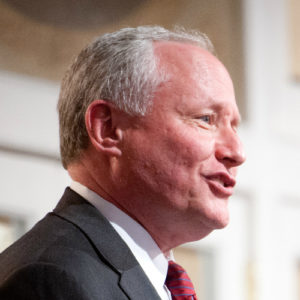Thinking Strategically
Study American strategic culture, and the factors that influence when and how the United States uses military power.
Summer 2010
Washington, DC
This seminar offers students an introduction to and interpretation of American “strategic culture,” that is, the habitual ways and purposes that influence when and how the United States uses its military power. Beginning with pre-Revolutionary British roots and charting the effects of the wars from independence in 1776 and 1812, the fulcrum of the course will be a day-long “staff ride” to Gettysburg, taking a role-play approach to understanding the causes, the conduct, and the consequences of the war that ensured America would be “whole and free.” Following an assessment of the post-World War II “world America made,” the course will conclude with a student-led exercise to formulate a strategy for the 21st century.
Image: Allyn Cox, The Monroe Doctrine, 1823, courtesy Architect of the Capitol
Thomas Donnelly on Challenges to U.S. Primacy

Gary Schmitt is the co-director of the Marilyn Ware Center for Security Studies at AEI and the director of AEI’s Program on American Citizenship. Mr. Schmitt is a former staff director of the Senate Select Committee on Intelligence.

Gary Schmitt is the co-director of the Marilyn Ware Center for Security Studies at AEI and the director of AEI’s Program on American Citizenship. Mr. Schmitt is a former staff director of the Senate Select Committee on Intelligence. He was executive director of the President’s Foreign Intelligence Advisory Board during President Ronald Reagan’s second term.
His books include Of Men and Materiel: The Crisis in Military Resources (AEI Press, 2007), to which he was a contributing author and editor with Tom Donnelly; Silent Warfare: Understanding the World of Intelligence (Brassey’s, 2002), coauthored with Abram Shulsky and now in its third edition; and U.S. Intelligence at the Crossroads: Agendas for Reform (Brassey’s, 1995), a coedited volume to which he is a contributing author. His most recent books,, to which he is author or editor and contributing author, include The Professions and Civic Life (Lexington Book, 2016), Trendsetting Charter Schools: Raising the Bar for Civic Education (Rowman & Littlefield, 2015), The Rise of China: Essays on the Future Competition (Encounter Books, May 2009), and Safety, Liberty and Islamist Terrorism: American and European Approaches to Domestic Counterterrorism (AEI Press, 2010).

Thomas Donnelly, a defense and security policy analyst, is the co-director of the Marilyn Ware Center for Security Studies at AEI. From 1995 to 1999, he was policy group director and a professional staff member for the House Committee on Armed Services.

Thomas Donnelly, a defense and security policy analyst, is the co-director of the Marilyn Ware Center for Security Studies at AEI.
He is the co-author with Frederick W. Kagan of Lessons for a Long War: How America Can Win on New Battlefields (2010). Among his recent books are Ground Truth: The Future of U.S. Land Power (2008), co-authored with Frederick W. Kagan; Of Men and Materiel: The Crisis in Military Resources (2007), co-edited with Gary J. Schmitt; The Military We Need (2005); and Operation Iraqi Freedom: A Strategic Assessment (2004).
From 1995 to 1999, he was policy group director and a professional staff member for the House Committee on Armed Services. Mr. Donnelly also served as a member of the U.S.-China Economic and Security Review Commission. He is a former editor of Armed Forces Journal, Army Times, and Defense News.
Readings:
Readings:
The seminar at Gettysburg National Battlefield will be conducted in the form of a “staff ride”—an interactive battlefield walking tour—which is a traditional pedagogical method among military commanders and their staffs, practiced today at each of the armed services’ War Colleges. Prior to the seminar, participants will be provided with reading materials on the Battle of Gettysburg and its strategic significance within the context of the American Civil War. They will also be assigned the role of a key commander or political figure to represent throughout the day. During the seminar, participants will be asked to justify, defend, and explain decisions that their “character” made in the course of battle. Creativity is encouraged, but critical thought and persuasive argument are essential.
The day-long seminar will conclude with a discussion on the essential strategic lessons to be derived from the Battle of Gettysburg. Participants will be encouraged to reprise elements of their roles from earlier in the day, but will also be expected to provide their own evaluation and analysis of the decisions taken by commanders and political leaders prior to and throughout the battle. The goal of this final session will be to determine the applicability of the lessons of Gettysburg—on the strategic and political level—to the conflicts of today.
Readings:
Discussion Questions:
Readings:

Gary Schmitt

Thomas Donnelly

Robert Kagan
Robert Kagan is a senior fellow with the Project on International Order and Strategy in the Foreign Policy program at the Brookings Institution. He is a contributing columnist at The Washington Post. His most recent book is The New York Times bestseller, The World America Made.

Vance Serchuk
Vance Serchuk is Executive Director of the KKR Global Institute and an Adjunct Senior Fellow at the Center for a New American Security. Prior to joining KKR, Mr. Serchuk served for six years as the senior national security advisor to Senator Joseph Lieberman (I-Connecticut).

Diana Schaub
Diana J. Schaub is Professor of Political Science at Loyola University Maryland and a member of the Hoover Institution’s task force on The Virtues of a Free Society. From 2004 to 2009 she was a member of the President’s Council on Bioethics.

Richard M. Reinsch II
Richard M. Reinsch II is the founding editor of Liberty Fund’s online journal Law and Liberty and the host of LibertyLawTalk. He writes frequently for such publications as National Affairs, Modern Age, National Review Online, The Weekly Standard, and The University Bookman, among other publications.

Steven F. Hayward
Steven F. Hayward is a senior resident scholar at the Institute of Governmental Studies at UC Berkeley, Senior Fellow of the Claremont Institute, and a visiting lecturer at Boalt Hall Law School. Hayward is the author of a two-volume narrative history of Ronald Reagan and his effect on American political life, The Age of Reagan: The Fall of the Old Liberal Order, 1964-1980, and The Age of Reagan: The Conservative Counter-Revolution, 1980-1989.

William Kristol
William Kristol is editor at large of The Weekly Standard, which, together with Fred Barnes and John Podhoretz, he founded in 1995. Mr. Kristol has served as chief of staff to the Vice President of the United States and to the Secretary of Education. Before coming to Washington in 1985, Kristol taught politics at the University of Pennsylvania and Harvard’s Kennedy School of Government.